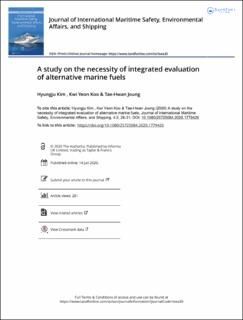| dc.contributor.author | Kim, Hyungju | |
| dc.contributor.author | Koo, Kwi Yeon | |
| dc.contributor.author | Joung, Tae-Hwan | |
| dc.date.accessioned | 2020-10-14T08:29:37Z | |
| dc.date.available | 2020-10-14T08:29:37Z | |
| dc.date.created | 2020-10-07T10:46:36Z | |
| dc.date.issued | 2020 | |
| dc.identifier.citation | Kim, H., Koo, K. Y., & Joung, T.-H. (2020). A study on the necessity of integrated evaluation of alternative marine fuels. Journal of International Maritime Safety, Environmental Affairs, and Shipping, 4(2), 26-31. | en_US |
| dc.identifier.issn | 2572-5084 | |
| dc.identifier.uri | https://hdl.handle.net/11250/2682621 | |
| dc.description.abstract | On 13 April 2018, the International Maritime Organization (IMO) published an initial strategy on reduction of greenhouse gas (GHG) emissions from ships. The ambitious vision of this strategy is to reduce the total annual GHG emissions from international shipping by at least 50% by 2050 compared to 2008. One of the solutions to achieve this vision is to operate vessels on alternative marine fuels that generate less or no GHG emissions, like liquefied natural gas (LNG), hydrogen, ammonia, methanol, ethanol, biofuel, synthetic fuel, electricity (produced by battery), and so on.
The challenge is that each alternative fuel has its own characteristic on various aspects. For instance, some alternative fuels may generate no GHG emission but can have higher risk than conventional marine fuel. Other alternative fuels may generate no GHG emission with relatively low risk, but the capital and/or operational expenditure can be significantly higher than other fuels. The main objective of this paper is to explore the properties of selected alternative marine fuels and to emphasize the necessity of integrated evaluation of them. It is concluded that the alternative marine fuels need to be comprehensively evaluated with respect to environmental impact, risk to human, and business value. | en_US |
| dc.language.iso | eng | en_US |
| dc.rights | Navngivelse 4.0 Internasjonal | * |
| dc.rights.uri | http://creativecommons.org/licenses/by/4.0/deed.no | * |
| dc.title | A study on the necessity of integrated evaluation of alternative marine fuels | en_US |
| dc.type | Peer reviewed | en_US |
| dc.type | Journal article | en_US |
| dc.description.version | publishedVersion | en_US |
| dc.rights.holder | © 2020 The Author(s). | en_US |
| dc.source.pagenumber | 26-31 | en_US |
| dc.source.volume | 4 | en_US |
| dc.source.journal | Journal of International Maritime Safety, Environmental Affairs, and Shipping | en_US |
| dc.source.issue | 2 | en_US |
| dc.identifier.doi | https://doi.org/10.1080/25725084.2020.1779426 | |
| dc.identifier.cristin | 1837838 | |
| cristin.ispublished | true | |
| cristin.fulltext | original | |
| cristin.qualitycode | 0 | |

